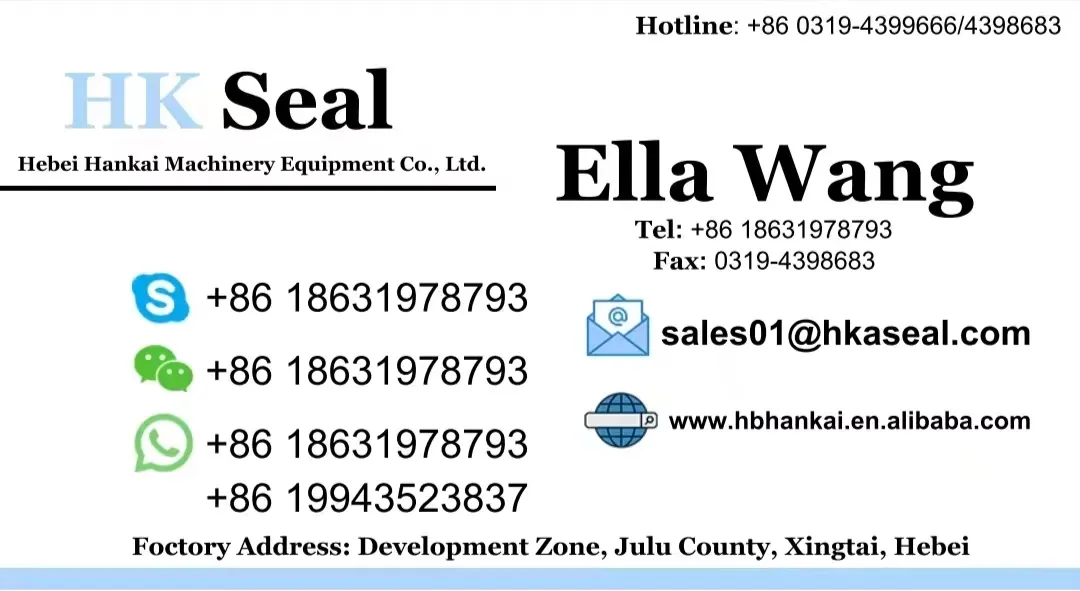नोभ . 05, 2024 19:05 Back to list
what is the purpose of oil seal
The Purpose of Oil Seals
Oil seals, sometimes referred to as grease seals or shaft seals, play a critical role in many mechanical applications, particularly in vehicles and industrial machinery. Understanding their purpose and functionality can help in appreciating their importance in ensuring efficient operations, preventing leaks, and extending the lifespan of equipment.
What is an Oil Seal?
An oil seal is a device made of elastomeric material, designed to prevent the escape of lubricants and the entry of contaminants into machinery. It typically consists of a metal casing or housing and a rubber or synthetic sealing element that provides a tight fit around rotating shafts or within mounting holes. The design of oil seals may vary depending on their application, with various shapes, sizes, and materials available to suit different needs.
Primary Functions of Oil Seals
1. Leak Prevention The most critical function of oil seals is to prevent the leakage of lubricating oils or greases from mechanical systems. In rotating machinery, the oil is essential for reducing friction and wear between moving parts. If oil were to leak, it could result in insufficient lubrication, leading to premature wear, overheating, and potential system failure. Therefore, oil seals help maintain the integrity of lubrication, ensuring that equipment runs smoothly and efficiently.
what is the purpose of oil seal

2. Contaminant Protection Alongside preventing leaks, oil seals also serve to keep contaminants out. Machines often operate in harsh environments where dust, dirt, and moisture can infiltrate and compromise the internal workings. Contaminants can cause rapid degradation of lubricants, increased wear and tear on components, and ultimately, equipment failure. Oil seals act as barriers to keep these harmful substances at bay, significantly enhancing the lifespan of the equipment they protect.
3. Pressure Maintenance Many mechanical systems operate under pressure, and oil seals are designed to help maintain that pressure. They provide a tight seal that prevents oil from escaping and ensures that pressure levels remain stable within hydraulic systems or engine components. This stability is crucial for the performance and efficiency of engines, pumps, and other machinery that relies on precise pressure control.
4. Temperature Regulation Machinery generates heat during operation, and oil seals can aid in temperature regulation. Proper lubrication helps in dissipating heat, and by preventing leakage, oil seals ensure that the oil remains where it is needed. This is especially important in high-performance applications such as racing engines or heavy-duty machinery, where overheating can lead to catastrophic failures.
5. Reducing Maintenance Costs By preventing leaks and protecting against contamination, oil seals can significantly reduce maintenance costs over time. Equipment that operates with well-functioning oil seals experiences fewer breakdowns and requires less frequent servicing. This leads to lower operational costs and increased productivity, making oil seals a worthwhile investment for any mechanical system.
Conclusion
In summary, oil seals are essential components in a wide range of machinery and vehicles. Their primary purpose is to prevent leaks of lubricating substances while providing a barrier against contaminants. By maintaining pressure, regulating temperature, and reducing maintenance costs, oil seals play a crucial role in enhancing the overall performance and reliability of mechanical systems. Whether in automotive applications or industrial machinery, the significance of oil seals cannot be overstated. Proper installation and maintenance of these seals contribute to the longevity and efficiency of equipment, making them invaluable in any operation where moving parts are involved. Understanding and appreciating their function allows for better maintenance practices and the optimization of machinery performance.
-
The Trans-formative Journey of Wheel Hub Oil Seals
NewsJun.06,2025
-
Graphene-Enhanced Oil Seals: Revolutionizing High-Pressure Oil Sealing
NewsJun.06,2025
-
Future of Hydraulic Sealing: Advanced Intelligent TCN Oil Seals
NewsJun.06,2025
-
Don’t Let a Broken TCV Oil Seal Ruin Your Day
NewsJun.06,2025
-
Bio-Inspired Dust Seals for Better Sealing Performance
NewsJun.06,2025
-
Biodegradable and Sustainable Hydraulic Seal Materials
NewsJun.06,2025
-
Top Oil Seal Solutions for Your Industrial Needs
NewsMay.22,2025
Products categories
















